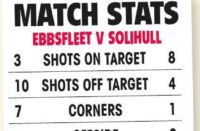Mental Health among footballers needs expert input, says Ian Herring
By Matt Badcock
Ian Herring says football needs to put as much emphasis on mental health as it does physical health.
The former Hungerford Town manager is a big advocate of change and, in Mental Health Awareness week, has explained to The NLP why clubs should be provided with a support network to help players.
Herring, 36, has spoken openly about going through IVF treatment with wife Natalie – they now have a one-year-old called Isaac – and the impact it had on them.
And he believes more must be done to encourage the subject of mental health into the open.
“People are starting to open up more,” Herring told The NLP. “In the macho world of football, players can find it hard. Last year I had a lad with anxiety, another with confidence issues and another thinking of quitting college.
“There needs to be real support for these players. Especially for players who are dropping out of the professional game and coming to Non-League clubs – they’ve got all sorts of obstacles they’ve got to get over. That sort of support from specialist people is important. It’s how I want to manage going forward.
“It’s not just football, we talk about men bottling things up, everyone finds it hard to say when they’re struggling. I think it is hugely important for people to be able to talk and open up – and know they are valued and would be listened to.
“In a club environment it can be hard for a manager. I put things in place but how honest are those players with their manager? At the back of their mind are they thinking, ‘I can’t show weakness in case I get left out of the side’.
“Personally, I wouldn’t leave anyone out of a side for things like that. Support networks need to be put into football clubs so young people feel there is somewhere they can reach out.”
Herring, who left the Crusaders last month, says the weight young players carry on their shoulders when their football dream doesn’t pan out as hoped is a key area to address.
“When I was at Swindon I got released three times,” Herring said. “The rejection hurts you. I’ve always seen myself as being resilient. Technically, I perhaps wasn’t the best and I’ve played under managers who shouted at me but I didn’t think it really affected me. You look back and it does. Nobody wants to be told they’re not very good.
“You go through life hurdles – trying to find work when you’re a part-time footballer but still chasing a dream.
“It’s really hard. I go back to when I was 15 to career sessions at school. ‘What do you want to do?’ ‘Well, I’m going to be a footballer’. They say, ‘You’ve got to think about if you’re not,’ but it’s like, ‘No. I am’.
“I flirted with full-time at Salisbury and Northwich until I was 25, 26, and then it hits you – you’ve got to get a job and you’re playing catch-up. (Former Crawley striker) Matt Tubbs put something on Linkedin this week which was extremely good about planning for not being in football. It’s hard. People can find themselves in a rut or in dead-end jobs. That’s a hard thing for young people.
“I think it is better now with kids having a back-up plan but that was hard for me. Also my mum having bipolar and manic depression. It’s got better but it’s hard to get the treatment.
“Two years ago we had a game at Havant & Waterlooville. At 1.30pm, I’m filling the bottles up and I get a phone call from the hospital that they’ve found my mum walking the streets in her dressing gown and she’s been out all night. Then it’s what do you do?
“You get through the game, dash home and deal with trying to get your mum the help she needs before you go again to training on a Tuesday where you’ve got to be leading a team as if there’s no problem. Everyone goes through their problems. The more support is there for Non-League clubs, the better.”
Herring has a clear vision for how he wants to manage with a people-first approach.
At Hungerford he would ask his players to answer a short confidential survey each week. Rating each aspect from 1-10, they would be asked questions about how they’d slept, how they felt before the game, how nervous were they and how did they feel during a game.
“I think a manager’s sole responsibility is to look after the health and welfare of all their players and staff,” Herring said. “That includes their mental wellbeing. I’d like to see more done to have specialised care at clubs.
“That comes at a cost and have Non-League clubs got that? Personally, I think it is something that should be factored into every budget.
“I have a Life Coach and it’s something we elaborated on. When we brought in GPS vests at Hungerford around Christmas, I was downloading the data and watching the game back. I just thought, ‘Hold on a minute, everything physical is monitored. But what is monitored mentally?’
“Your mind is so important so I devised a thing with the players where they would give me scores on ten different aspects. If somebody has got a low score for sleep, not a good enjoyment factor and a not so good performance, it might give you the opportunity to ask, ‘Is everything okay?’.
“Rather than wait for people to open up, can you go to them? Some people might need that.”

























